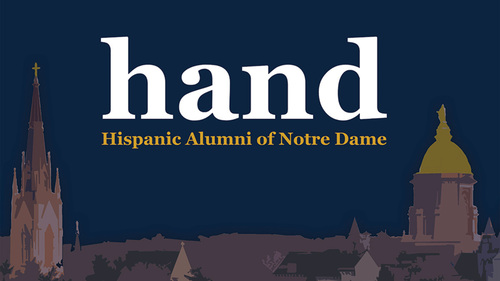
Members of the Hispanic Alumni of Notre Dame (HAND), a University of Notre Dame Alumni Association affinity group, gathered virtually Tuesday (Sept. 21) for the second annual Hispanic alumni success stories panel. The event is one of several hosted by the Institute for Latino Studies in celebration of National Hispanic Heritage Month.
In opening remarks, Luis Fraga, the Joseph and Elizabeth Robbie Professor of Political Science and director of the Institute for Latino Studies, welcomed attendants. “We are delighted to collaborate and support the Hispanic Alumni of Notre Dame in their efforts to share their life experiences and professional expertise,” he said.
Cristina Gonzalez, a lawyer and board member of HAND, opened the discussion by emphasizing how the alumni group supports its members. “We represent you all, the Hispanic Alumni of Notre Dame, and advocate for you,” she said. “We advocate for not only the students, but also faculty and also alumni; that’s our job. And there are many different things we do to encourage community and participation.”
Alex Montoya, a public relations account executive and writer, started the panel discussion. “I was born in Colombia and immigrated to the United States at age 4. I was born with a disability, and my parents sent me to this country to live with family members for better opportunities.”
Since junior high school, Montoya had his sights set on the University of Notre Dame. “When I was accepted, I didn’t want to even consider anywhere else,” Montoya said. “I have worked in professional sports. I have worked for nonprofit organizations. I have worked for business organizations. But the wonderful thing is, no matter the different fields that I moved to or jumped around to, my communications degree from Notre Dame was helpful in each and every one of those fields and each and every one of those jobs.”
Timi Aguilar, president and CEO of Aguilar Public Relations, said her experience as a student in the film department helped her succeed in her career.
“Everything that I did was community focused, and I did a film for the homeless center, and I did something for the Center for Social Concerns,” Aguilar said. “Which then launched me into being a video producer doing corporate industrials for AT&T, and then from there traveling across the world as an executive producer.”
Elizabeth Bodamer, a diversity, equity and inclusion policy and research analyst and senior program manager at the Law School Admission Council, talked about her experience with the ILS. “ILS is where I really got to be surrounded by anything Latinx, the history, the people, the diversity within the community across the country.”
She credited her experience at Notre Dame for leading her to her current role. “Today, I get to do diversity, equity and inclusion work centering on our communities, our underserved, marginalized communities, to make a difference, and that all started because I went to Notre Dame.”
Bodamer added, “My biggest takeaway for students today is to really immerse yourself. You know, you’ll have your moments of homesickness, you’ll have your moments of doubt, but there are good people around you. We’ve been there and you can do this. You belong here.”
Dr. Kristine Muñoz Glass, a Navy veteran and psychiatrist serving the veteran population in El Paso, Texas, and Las Cruces, New Mexico, said that although her experience at Notre Dame was one of the best of her life, she wanted to touch on struggles that human beings face when moving toward graduate school.
“My father became ill and passed away before my senior year,” Muñoz Glass said. “I bring this up because it was a really big point in my life obviously for the direction that I went, but also for the community that I developed.”
She went on to say her time at Notre Dame was both beautiful and very hard. “There will be some speed bumps along the road for a dream, but always pursue, always push. Don’t give up.”
For the Q&A portion, Paloma Garcia-Lopez, associate director of the ILS, asked the panelists about experiences with faculty and staff that made campus feel like home.
“What made it feel like home for me — and this is something that I certainly urge each student to do — were the faculty and administrators who agreed to sign on as mentors,” Montoya said. “Everyone should absolutely seek out a mentor.”
Bodamer agreed. “There are so many opportunities, so many ways that the institution is trying to be that facilitator between you and a potential mentor. Take advantage of that.”
Garcia-Lopez closed the discussion by asking the panelists to give students advice on how to decide what to do after college.
“I’m a big believer in networking,” Aguilar said. “Go to your alumni clubs, start talking to people in the room. The alumni are great at connecting people. It’s really about putting yourself out there and looking at what’s available.”
In closing, Fraga said, “The Institute for Latino Studies, for everyone in the audience and certainly for our panelists, is here at the University to work with you, to help you.”
The Institute for Latino Studies has a number of events planned to celebrate National Hispanic Heritage Month. For more information, visit https://latinostudies.nd.edu/news-events/hispanic-heritage-month/.